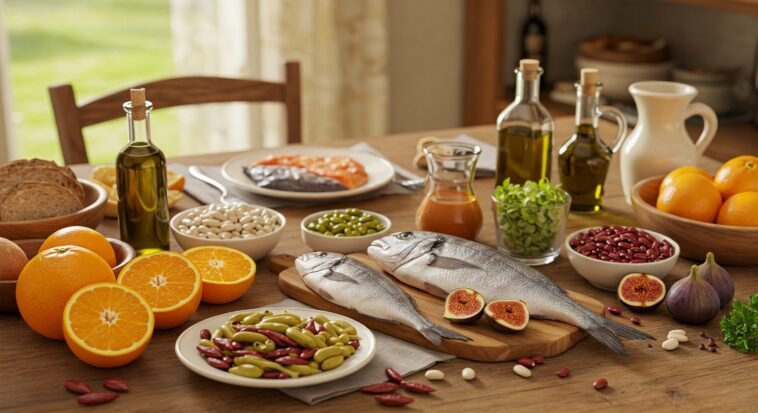
We live in a world where fast food is everywhere and brain food is… kinda MIA.
But if you want your mind sharp enough to win trivia night or avoid asking, “Wait, why did I walk into this room?”—listen up.
The Mediterranean diet isn’t just some foodie fad.
It’s been around forever and science says it helps boost memory, focus, and even lowers your risk of Alzheimer’s.
Basically, it’s like giving your brain a Marvel superhero upgrade (minus the radioactive spider).
In this guide, we’ll break down why this way of eating is so good for your noggin—and give you a no-stress, 7-day meal plan to get started.
Your brain will thank you.
Probably in the form of better ideas and fewer “senior moments.”
What Is the Mediterranean Diet?
The Mediterranean diet isn’t just a meal plan—it’s a whole vibe.
Born from the traditional eating habits of coastal countries like Greece, Italy, and southern France, this style of eating has fueled generations of people who live long, think sharp, and probably know how to make killer hummus.
Here’s the basic formula (no complicated math required):
- Fresh fruits and vegetables
- Whole grains
- Healthy fats (especially olive oil)
- Nuts and seeds
- Legumes
- Moderate fish and poultry
- Limited red meat and sugar
- Wine in moderation (optional)
But it’s not just what you eat—it’s how you eat. Picture this: long, social dinners, no phones at the table, walking after meals, and actually enjoying your food.
It’s less crash dieting, more “French Riviera meets brain science.”

How the Mediterranean Diet Supports Brain Health
Let’s break down why the Mediterranean diet is basically brain fuel disguised as delicious food.
Spoiler: it’s not just about looking good in a flowy linen outfit on the Amalfi Coast.
It fights brain fog like a superhero squad
Your brain hates stress and inflammation—two villains behind memory loss and diseases like Alzheimer’s.
Luckily, the Mediterranean diet comes loaded with antioxidants (the good guys), found in berries, leafy greens, and olive oil.
These work like the Avengers: fighting off cellular damage so your brain stays sharp.
Study Insight: A 2015 review in Frontiers in Aging Neuroscience found this diet helps slow down cognitive decline and lowers Alzheimer’s risk. Basically, your brain ages slower—like Paul Rudd.
Healthy heart = Happy brain
Your brain runs on blood and oxygen.
So if your heart’s not pumping well, your brain isn’t getting what it needs to perform.
Enter omega-3s—found in salmon, sardines, and other oily fish—which help lower blood pressure and keep arteries squeaky clean.
Think of them as the WD-40 for your bloodstream.
Supports Gut Health, Which Affects Mental Health
Ever get hangry and feel like Thanos with a migraine? That’s your gut talking.
Science shows your gut and brain are in constant communication (they text more than teenagers).
When you feed your gut the good stuff—like fiber-packed veggies and legumes—you boost mood, calm anxiety, and even sharpen focus.
That’s the power of a healthy microbiome.

Best Brain-Boosting Foods in the Mediterranean Diet
| Food Group | Brain Benefits |
| Fatty fish (salmon, sardines) |
Rich in DHA, supports memory and reduces risk of dementia
|
| Leafy greens (spinach, kale) |
Loaded with folate, lutein, and vitamin K, which protect neurons
|
| Berries (blueberries, strawberries) |
High in antioxidants that reduce brain aging
|
| Olive oil |
Contains polyphenols with anti-inflammatory effects
|
| Nuts (walnuts, almonds) |
Packed with vitamin E and healthy fats for cognitive function
|
| Whole grains |
Provide slow-releasing glucose to fuel the brain
|
| Legumes |
Supply protein and fiber to regulate mood and energy
|
7-Day Mediterranean Diet Meal Plan for Brain Health
No crash diets. No weird powders. Just real food your brain loves.
This week-long plan makes it easy to get those brain-boosting nutrients without losing your mind—or your taste buds.
Let’s go full Mediterranean mode.
Day 1
- Breakfast: Greek yogurt + blueberries + walnuts + a drizzle of honey = your morning brain smoothie in bowl form.
- Lunch: Quinoa salad with chickpeas, cherry tomatoes, cucumber, and feta. Basically, sunshine in a bowl.
- Dinner: Grilled salmon with sautéed spinach and wild rice. Omega-3s doing heavy lifting here.
- Snack: Almonds. Simple. Powerful. Like the Jedi of brain food.
Day 2
- Breakfast: Oatmeal with strawberries and a drizzle of olive oil. Trust the EVOO—it’s liquid brain armor.
- Lunch: Lentil soup with whole grain bread. Fiber city.
- Dinner: Roasted chicken with sweet potatoes and Brussels sprouts. Captain America–level balanced meal.
- Snack: Carrot sticks + hummus = crunchy, creamy, craveable.
Day 3
- Breakfast: Whole grain toast with avocado and a poached egg. Brunch vibes, Monday energy.
- Lunch: Tuna-stuffed bell peppers with couscous. James Bond’s lunch if he cared about brain health.
- Dinner: Baked eggplant with tomato sauce and herbs. Basically a Mediterranean hug.
- Snack: One square of dark chocolate (70%+). Dessert, but make it functional.
Day 4
- Breakfast: Spinach + banana + chia + almond milk smoothie. Hulk strength in a cup.
- Lunch: Grilled veggie wrap with tzatziki. Fresh, fun, and packed with fiber.
- Dinner: Sardines over arugula + white bean salad. Underrated brain food—don’t sleep on sardines.
- Snack: Mixed nuts. Tiny but mighty.
Day 5
- Breakfast: Cottage cheese with pear slices and flaxseed. Sweet, creamy, smart.
- Lunch: Whole grain pasta with cherry tomatoes, basil, and olive oil. Your inner Italian is cheering.
- Dinner: Baked cod with olives, tomatoes, and quinoa. Spa day for your neurons.
- Snack: Greek yogurt. Tangy, tasty, probiotic-rich.
Day 6
- Breakfast: Scrambled eggs + kale + whole grain toast. Brain fuel, leveled up.
- Lunch: Chickpea salad with lemon and parsley. Protein-packed and bright.
- Dinner: Stuffed zucchini boats with brown rice and lentils. Cozy comfort, but with fiber.
- Snack: Apple slices with almond butter. Childhood fave with a smart twist.
Day 7
- Breakfast: Muesli with dried fruit and milk. Low effort, high reward.
- Lunch: Mediterranean platter: olives, cheese, hummus, veggies, pita. Like hosting a mini food festival.
- Dinner: Grilled shrimp with couscous and asparagus. Elegant. Easy. Elite.
- Snack: A glass of red wine (optional) and a few walnuts. You’ve earned your Mediterranean moment.

Practical Tips to Maintain the Mediterranean Diet
Let’s be real: knowing what to eat is one thing.
Making it happen between work, life, and binge-watching Netflix? Whole other story.
But good news—this lifestyle is built for real people with real schedules.
Here’s how to make it work long-term:
Plan your meals ahead
Meal prep = your secret weapon.
When you’ve got healthy meals ready to go, it’s way easier to skip the vending machine drama.
Think of it like building your own superhero utility belt—only with Tupperware.
Stock your pantry
Keep the MVPs on deck: olive oil, canned beans, whole grains, dried herbs, canned tuna, and pasta.
That way, even on your laziest days, you can still whip up something brain-boosting faster than you can say “DoorDash.”
Cook at home more often
No need to be a gourmet chef—just know what’s going into your meals.
Cooking at home helps you ditch hidden sugars and extra salt.
Plus, it’s a great way to impress a date and your neurons.
Eat mindfully
Slow down. Savor. Eat with friends or family when you can.
The Mediterranean lifestyle isn’t just about what you eat—it’s about enjoying it.
Think less drive-thru, more “long lunch on a terrace in Santorini.”
Stay active
You don’t need a CrossFit membership to live Mediterranean.
A daily walk, some light stretching, or a dance break while cooking (yes, that counts) keeps the blood flowing and your brain thriving.
FAQs
Yes. Numerous studies, including one from the Alzheimer’s Association, have shown that people following the Mediterranean experience a significantly reduced risk of developing Alzheimer’s disease.
Absolutely. While fish and poultry are part of the traditional Mediterranean diet, plant-based versions with legumes, grains, nuts, seeds, and dairy still offer brain benefits.
While cognitive improvements may not be immediate, long-term adherence is associated with sustained brain health and slower age-related decline. Many also notice better mood and energy within weeks.
Conclusion: Feed Your Brain, Fuel Your Life
The Mediterranean diet isn’t just a trend—it’s a lifestyle upgrade backed by science and centuries of common sense.
It’s how you eat if you want to think clearer, live longer, and feel more like the best version of you (think Yoda wisdom with Iron Man energy).
By focusing on real, whole foods—fruits, veggies, healthy fats, and fiber—you’re not just helping your heart and gut.
You’re giving your brain the premium fuel it needs to stay sharp, focused, and ready for anything.
Start with the 7-day plan. Tweak it to fit your vibe.
Enjoy the process. Because better brain health doesn’t come from a supplement bottle—it starts with what’s on your plate.



